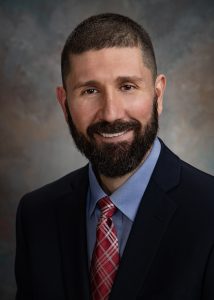 David L. Albright, Hill Crest Foundation Endowed Chair in Mental Health and professor, has concluded his work on the National Academies of Sciences, Engineering, and Medicine to the Committee on the Well-being of Military Families.
David L. Albright, Hill Crest Foundation Endowed Chair in Mental Health and professor, has concluded his work on the National Academies of Sciences, Engineering, and Medicine to the Committee on the Well-being of Military Families.
In Fall 2018, Dr. Albright was appointed to the National Academies of Sciences, Engineering committee to study the challenges and opportunities facing military families and what is known about effective strategies for supporting and protecting military children and families and lessons to be learned from these experiences. The committee reviewed available data and research on military children and families, including those who have left the military, with attention to differences by race, ethnicity, and other factors.
In July, the committee released its finding in a consensus study report titled: “Strengthening the Military Family Readiness System for a Changing American Society.” Supporting the well-being of military families is foundational to ensuring the readiness of military personnel. In an effort to make sure its efforts to support military families are addressing their needs in a rapidly changing society, the U.S. Department of Defense (DoD) asked the National Academies of Sciences, Engineering, and Medicine to study the challenges and opportunities facing military families and what is known about effective nstrategies for supporting the functioning and well-being of these families.
The National Academies’ report, Strengthening the Military Family Readiness System for a Changing American Society, finds that the DoD and military service branches have many programs and policies to support the well-being of military families, but they need to employ a more coordinated and comprehensive approach to matching the needs of individual families to available programs. The report also concludes that due to the widespread changes in societal norms and family structures that have occurred in recent years, greater attention needs to be given to the diversity of family structures that exist today.
BETTER COORDINATION OF SERVICES NEEDED, ALONG WITH MORE DATA
ON FAMILIES
The National Academies’ study committee identified two particular areas in which DoD could strengthen its Military Family Readiness System (MFRS) to better serve military families and Service members. DoD’s MFRS would benefit from greater coordination. The wide array of social supports offered by the MFRS are provided at various levels within the military—the DoD level, the service branch level, and, in many cases, the installation or military base level. However, it is unclear to what extent the service providers at the various levels of the military are aware of one another or coordinate the provision of services with one another. While the current MFRS provides many valuable services
for military families, it is siloed, resulting in a diffusion of labor and responsibility and, in some instances, fragmented service delivery. The system lacks a comprehensive, coordinated framework to support individual and population well-being, resilience, and readiness among military families. Addressing this weakness could improve the quality of services provided, encourage innovation, and support effective response capabilities.
More data are needed on the changing nature of military families. The diversity and complexity of families have increased in the United States over the last few decades, and these shifts have multiple implications for DoD. The DoD’s existing data on military families are insufficient for understanding the degree to which societal shifts in family structure are reflected in the military community. Data are lacking on long-term nonmarital partners, parents, ex-spouses and ex-partners, and others who play a significant role in the care of military children and Service members. As a result, current military statistics may mislead policy makers and program managers, potentially resulting in some types of families being underserved by the MFRS.
For the committee’s full report visit, nas.edu/MilitaryFamilies.